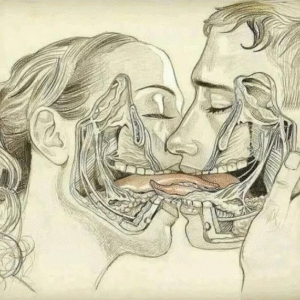
💋 What Happens When We Tongue Kiss: The Science, Emotion, and Chemistry Behind French Kissing
Tongue kissing—often called French kissing—is one of the most intimate and electrifying forms of human connection. It’s more than just a romantic gesture; it’s a full-body experience that activates our senses, triggers emotional bonding, and even influences our health. Whether it’s your first kiss or a familiar ritual with a long-term partner, tongue kissing is a powerful blend of biology, psychology, and passion.
Let’s explore what really happens when we engage in this deeply personal act.
🧠 The Brain on a Kiss
When your lips meet someone else’s and your tongues begin to dance, your brain lights up like a fireworks display. Several regions activate simultaneously:
- Pleasure centers release dopamine, the “feel-good” neurotransmitter.
- Memory zones engage, helping you remember the moment vividly.
- Emotional bonding areas trigger the release of oxytocin, the “love hormone.”
This cocktail of chemicals creates a sense of closeness, trust, and desire. It’s why a single kiss can leave a lasting impression—and why we often remember our first kiss for life.
💓 Physical Reactions
Tongue kissing isn’t just about lips and tongues—it’s a full-body experience. Here’s what happens physiologically:
- Heart rate increases as arousal builds.
- Breathing quickens, preparing your body for deeper intimacy.
- Pupils dilate, signaling attraction.
- Skin becomes more sensitive, especially around erogenous zones.
These reactions are part of the body’s natural response to physical closeness and emotional stimulation.
👅 The Role of the Tongue
The tongue is one of the most sensitive organs in the body. It contains eight muscles and thousands of nerve endings, making it a powerful tool for pleasure and communication.
During a French kiss:
- The tongue explores, teases, and responds to your partner’s movements.
- It sends signals to the brain that amplify arousal and emotional connection.
- It helps establish rhythm and chemistry between partners.
The tongue’s movements can be playful, passionate, or tender—each style conveying different emotions and intentions.
🧬 Saliva Exchange and Immunity
One surprising benefit of tongue kissing is its impact on your immune system. When you kiss, you exchange saliva—and with it, millions of bacteria.
- A 10-second kiss can transfer up to 80 million bacteria.
- This microbial exchange helps your body build immunity by exposing you to your partner’s microbiome.
- It’s a natural way to strengthen your immune defenses—though it’s not without risks if one partner is sick.
So while it might sound gross, swapping spit is actually a form of biological bonding.
💞 Emotional Vulnerability
Tongue kissing is deeply personal. Unlike a peck on the cheek or a quick smooch, it requires trust, openness, and mutual desire.
- It says, “I’m letting you in.”
- It creates a moment of shared vulnerability.
- It can reignite passion in long-term relationships or test chemistry in new ones.
In fact, many couples use kissing as a way to reconnect emotionally. A soft, meaningful kiss can say “I love you” more powerfully than words.
🧠 Psychological Insights
According to Sheril Kirshenbaum, author of The Science of Kissing, the lips are one of the body’s most sensitive erogenous zones. They contain more nerve endings than fingertips, and the skin is incredibly thin—making every touch feel amplified.
Kissing also helps us assess compatibility. Through taste, smell, and touch, we subconsciously evaluate our partner’s genetic makeup and emotional responsiveness.
🧪 Hormonal Cascade
Tongue kissing triggers a cascade of hormones:
- Dopamine: Creates feelings of pleasure and reward.
- Oxytocin: Promotes bonding and trust.
- Endorphins: Reduce stress and increase happiness.
- Adrenaline: Heightens alertness and excitement.
This hormonal mix explains why kissing can feel addictive—and why it’s often the gateway to deeper intimacy.
🧭 Cultural Significance
Across cultures, kissing holds different meanings:
- In Western societies, French kissing is a sign of romantic or sexual interest.
- In some Eastern cultures, public kissing is taboo.
- In ancient times, kissing was used to show respect, loyalty, or submission.
Despite these differences, the act of kissing remains a universal expression of connection.
🧼 Hygiene and Etiquette
To make tongue kissing enjoyable for both partners, hygiene matters:
- Fresh breath is essential—brush, floss, and use mouthwash.
- Consent is key—never assume someone wants to kiss.
- Adjust to your partner’s rhythm—some prefer slow and tender, others like passionate and intense.
The best kisses come from tuning into your partner’s energy and responding with care.
🧠 Why It Feels So Good
French kissing stimulates more of the brain than even genital touch. The lips and tongue are wired to pleasure centers, and the act of kissing engages multiple senses—touch, taste, smell, and even sound.
It’s a multisensory experience that creates emotional resonance and physical satisfaction.
🧠 Long-Term Benefits
In long-term relationships, kissing helps maintain intimacy:
- It reinforces emotional bonds.
- It reduces stress and anxiety.
- It reminds partners of their connection.
Couples who kiss regularly report higher relationship satisfaction and stronger emotional ties.
🧭 So Why Do We Tongue Kiss?
Because it feels good. Because it connects us. Because it’s a language of love, desire, and trust.
Whether it’s a fiery kiss in the rain or a gentle kiss before bed, tongue kissing is one of the most powerful ways humans express affection.


